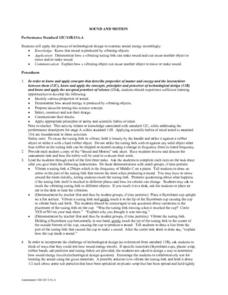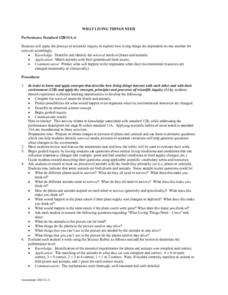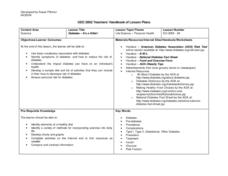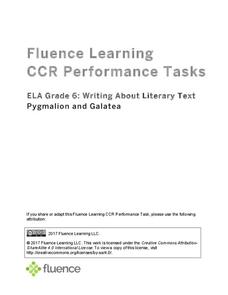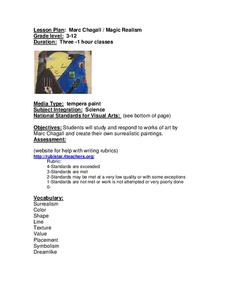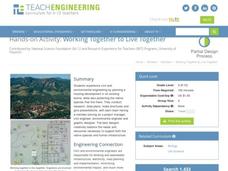Curated OER
Airing Our concerns: I Can See Clearly Now
Students research specific answers to questions about air pollution. In this air pollution lesson, students share information to fully understand the causes of air pollution. Students role play individuals from different groups to...
Curated OER
Local Habitats
Students create dioramas that depict a habitat. In this habitat lesson, students use a variety of art items to develop either a marine, freshwater/pond, or forest habitat in a box. They write an expository essay about their habitat, and...
Curated OER
Language Arts Exploration
While an interesting lesson plan idea involving the exploration of a story about an Asian American boy named Imduk, a teacher would need to have assess to the Scott Foresman reading program to make this work. If not, a teacher could use...
Curated OER
Classifying Living Things
Students identify how to classify living things. They classify various concepts including family members, kinds of clothing, numbers, shapes, and vocabulary words. They discuss how to classify various concepts and classify pictures of...
Curated OER
Major Functions
Seventh graders investigate the basic characteristics and needs of living things. They identify the major parts of plants and animals by making lists. Students focus upon one living thing and speculate how if one part is changed how it...
Curated OER
Sound And Motion
Learners investigate the concept of sound and vibration. They use a tuning fork to make an observation. Students then propose the ideas of different experimental designs to test the concept. The ideas are constructed and then tested.
Curated OER
What Living Things Need
Students apply the process of scientific inquiry to explore how living things are dependent on one another for survival. They match animals with their generalized food source. Students predict what happens to the organisms when their...
Curated OER
What Do Parts Do?
Learners review the components of the scientific inquiry method. In groups, they identify and describe the components and functions of all of the parts of a plant. Using a diagram, they label the parts of the plant chosen and share...
Curated OER
Journal of the Stars
Students receive balloons representing the "Life Cycle of the Stars." As the attached script is read, students follow the directions for the color of balloon they are given. Students chart the results for their star. They plot data from...
Curated OER
Space Program Spin-Offs
Students brainstorm types of accommodations needed for space travel. They create a table of categories for these accommodations and work in groups to research the categories. Each group puts together a five minute presentation to present...
Curated OER
Diabetes - It's a Killer!
Students survey, graph and chart their prior knowledge about diabetes. They read a handout and complete a K-W-L chart. They develop a rubric to assess their diet and exercise and develop a shopping list, menu and exercise plan to share.
Curated OER
Magnetic Force
Students are introduced to the attraction and repulsion of magnetic forces. In groups, they observe how the forces react with different materials and record their data. They develop their own conclusions about the poles of magnets and...
Curated OER
Breaking the Food Chain
Students investigate the food chain. They brainstorm questions about the human food chain and explain what would happen to living things in the food chain if organisms or resources were removed. They role-play situations in which the...
Curated OER
Phone Number Lesson
First graders practice their phone number. In this phone number lesson, 1st graders discuss the importance of memorizing one's phone number. They practice memorizing their own phone number and recite it for the teacher.
Inside Mathematics
Winning Spinners
Winning a spin game is random chance, right? Pupils create a table to determine the sample space of spinning two spinners. Individuals determine the probability of winning a game and then modify the spinners to increase the probability...
Fluence Learning
Writing About Literary Text: Pygmalion and Galatea
Is it crazy to fall in love with your own work, or is that the purest love of all? Compare two renditions of the classic Greek myth Pygmalion and Galatea with a literary analysis exercise. After students compare the similarities and...
Fluence Learning
Writing About Literature: What Is Happiness?
Jack London's heart for adventure has come to define the spirit of America and its frontier. Selected passages from the foreword The Cruise of the Snark take eighth graders through London's construction and voyage of his ship before...
Fluence Learning
Writing Informative Text: Did Shakespeare Write Shakespeare?
William Shakespeare penned some of the richest and most fascinating works of literature—or did he? Middle schoolers read three brief informative passages and conduct additional research to evaluate the claim that Shakespeare did not...
Teach Engineering
Chair Design
Can you design the perfect chair? Scholars apply the engineering design process to design and build a prototype of a new type of chair from wires. They test their designs with a wooden artist model or stuffed animal.
Duluth-Superior Area Educational Television Corporation
Marc Chagall / Magic Realism
Surrealistic painters like Marc Chagall and Wendy Rouse show viewers an expansive world in a small area. Young artists have a opportunity to create their own surrealistic paintings in response to a study of works by Chagall and Rouse.
Teach Engineering
Archimedes' Principle, Pascal's Law and Bernoulli's Principle
What do Pascal's law, Archimedes' Principle, and Bernoulli's Principle have to do with fluid mechanics? The included PowerPoint presentation provides the basic definitions and equations associated with the three. A set of homework...
National Security Agency
Backyard Building - Area and Perimeter
Turn young mathematicians into landscape architects with this four-lesson series on area and perimeter. Beginning with a basic introduction to calculating perimeter and area using non-standard units of measurement, this...
Constitutional Rights Foundation
Driver’s Licenses And Unauthorized Immigrants
Should driver's licenses be granted to unauthorized immigrants? That is the question class members grapple with in a lesson that asks them to first read a fact sheet that details the arguments for and against licensing unauthorized...
Teach Engineering
Working Together to Live Together
Whose home is it anyway? Design teams plan a housing development in which they must also protect a native species. The teams consist of a project manager, civil engineer, environmental engineer, and graphic designer. Teams present their...







